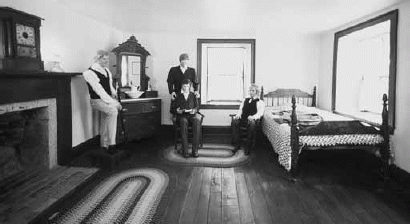|
The
Prophet Brigham Young made the above statement during several
church meetings and felt so strongly about it, that he had
his discourse, with the above statement, published as an
official church pamphlet and distributed among the members
of the Church.
In
The
Mormon Hierarchy : Origins of Power, Michael Quinn recounts
the last days of Smith's life:
1.
Smith denounced polygamy, destroyed polygamy revelation
"Smith was, in fact, willing to destroy the original manuscript
of the 1843 polygamy revelation. Based on "Many (some of
whom are now living)" in Utah, Joseph F. Smith wrote that
the prophet "consented for her [Emma Smith] to burn the
paper containing the original copy of the revelation." An
obscure 1853 publication also reported that the original
text of the polygamy revelation "by Joseph Smith's command
was burned."" (Quinn page 147) Quinn references Letter
of Joseph F. Smith to William E. McLellin, 6 Jan. 1880,
fd21, box 5, Scott G. Kenney Papers, Manuscripts Division,
Marriott Library.
"Emma
Smith remembered that the prophet did more than consent
to the revelation's destruction. According to her 1847 account,
while alone in their Mansion House bedroom, Smith "told
her that the doctrine and practice of polygamy was going
to ruin the church" and then he burned the revelation. Clayton's
diary shows just before the prophet returned to Emma [that
night], he told his secretary to burn the Council of Fifty's
minutes. It makes sense that while he was alone with her
the night of 23 June 1844, only hours before surrendering
for trial, he directed his attention to destroying the written
evidence of polygamy." (Quinn page 147) For the Emma
quote, Quinn references William E. McLellin letter to Joseph
Smith III, 10 Jan. 1861 and July 1872, archives, Reorganized
Church of Jesus Christ of Latter-day Saints. For the Clayton
reference, Quinn refers to Clayton diary 22 June 1844 with
an explanation referring to other Clayton journal entries.
2.
Smith ordered apostles to get rid of their garments
"Heber C. Kimball said Smith sent word to the apostles
on the east coast to destroy their garments they had received
in the endowment since 1842." (Quinn page 147) Quinn
references History of the Church 6:519 which mentions the
letter, and Heber C. Kimball's diary, 21 Dec. 1845, found
in the book "Smith, An Intimate Chronicle, page 224"
3.
Smith removed his own garments, instructed other to do the
same
"Smith removed his own endowment "robe" or garment before
he went to Carthage Jail and told those with him to do likewise.
His nephew Joseph F. Smith later explained, "When Willard
Richards was solicited [by Smith] to do the same, he declined,
and it seems little less than marvelous that he was preserved
without so much as a bullet piercing his garments."" (Quinn
page 146) Quinn references Heber J. Grant journal sheets,
7 June 1907, LDS Archives.
4.
In Carthage Jail, Smith drank wine
“Before the jailor came in, his boy brought in some water,
and said the guard wanted some wine. Joseph gave Dr. Richards
two dollars to give the guard; but the guard said one was
enough, and would take no more. “The guard immediately sent
for a bottle of wine, pipes, and two small papers of tobacco;
and one of the guards brought them into the jail soon after
the jailor went out. Dr. Richards uncorked the bottle, and
presented a glass to Joseph, who tasted, as brother and
the Doctor, and the bottle was then given to the guard,
who turned to go out.” (History of the Church, Vol. 6,
page 616)
 "Sometime
after dinner we sent for some wine. It has been reported
by some that this was taken as a sacrament. It was no such
thing,; our spirits were generally dull and heavy, and it
was sent for to revive us.... I believe we all drank of
the wine, and gave some to one or two of the prison guards."
(John Taylor, in History of the Church, Vol. 7, page 101)
"Sometime
after dinner we sent for some wine. It has been reported
by some that this was taken as a sacrament. It was no such
thing,; our spirits were generally dull and heavy, and it
was sent for to revive us.... I believe we all drank of
the wine, and gave some to one or two of the prison guards."
(John Taylor, in History of the Church, Vol. 7, page 101)
5.
Smith sent an order to the Mormon Nauvoo Legion to attack
Carthage jail “immediately” to free him
"The morning of 27 June, Smith sent an order (in his
own handwriting) to Major-General Jonathan Dunham to lead
the Nauvoo Legion in a military attack on Carthage "immediately"
to free the prisoners. Dunham realized that such an assault
by the Nauvoo Legion would result in two blood baths - one
in Carthage and another when anti-Mormons (and probably
the Illinois militia) retaliated by laying siege to Nauvoo
for insurrection. To avoid civil war and the destruction
of Nauvoo's population, Dunham refused to obey the order
and did not notify Smith of his decision. One of his lieutenants,
a former Danite, later complained that Dunham "did not let
a single mortal know that he had received such orders (from
Smith)."
"[Later
that same day] Around 5 p.m., more than 250 men approached
the Carthage Jail. When informed of this by the panicky
jailer, Joseph Smith replied: "Don't trouble yourself,
they have come to rescue me." (Quinn, Page 141)
Smith quickly discovered that the mob wasn't his rescue
army. After exchanging gunfire with the mob, Smith was killed.
6. Smith
did not give his life, or die as an innocent martyr
Smith shot three men the night of his death at Carthage
Jail and with his last breath attempted to use a Masonic
distress signal to prevent his death. See details here.
If
this really interests you, Quinn's book The
Mormon Hierarchy : Origins of Power contains a lot more
citations and historical evidences. |